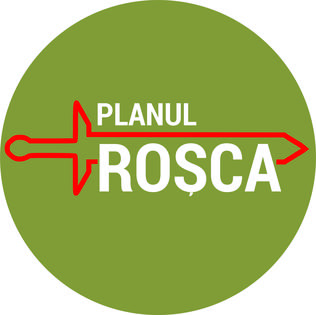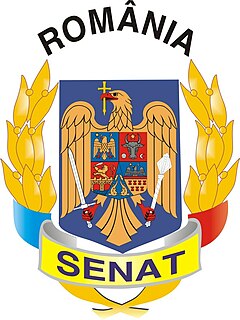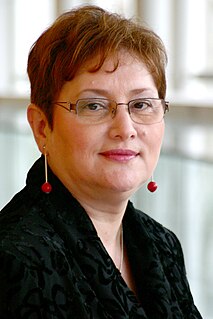
The National Peasants' Party was a Romanian political party, formed in 1926 through the fusion of the Romanian National Party from Transylvania and the Peasants' Party from the prewar kingdom. It was in power for most of the time between 1928 and 1933 with longtime leader Iuliu Maniu as prime minister. A moderately conservative party, with some left-wing corporatist views, it remained staunchly pro-monarchy.

The Social Democratic Party is the major social-democratic political party in Romania founded by Ion Iliescu, Romania's first democratically-elected president. The largest party in Parliament with initially 63 seats in the Senate and 158 seats in the Chamber of Deputies, it also has the largest number of mayors, local and county councilors and county presidents thus being the biggest and most influential political force in the country.

The Christian-Democratic People's Party is a Christian-democratic political party in Moldova. The party was led by Iurie Roșca from 1994 until 2011. Until 2005, the PPCD and the (Moldovan) National Liberal Party were the main political organizations in the country supporting the unification of Moldova and Romania. After the PPCD began supporting the anti-unification Communist President Vladimir Voronin, the party has lost its unionist credentials while other parties such as the Liberal Party have taken over the pro-Romanian ideological space. The party has had very poor results in all subsequent elections. Since April 2005, the PPCD has lost several deputies, mayors, councillors and members to the liberal-democratic parties. The PPCD was an informal coalition partner of the Party of Communists of the Republic of Moldova from 2005–2009.

The National Liberal Party is a conservative-liberal political party in Romania. Refounded in 1990, it claims the legacy of the major political party of the same name, active between 1875 and the late 1940s. Based on this legacy, it often presents itself as the first formally constituted political party in the country and the oldest party from the family of European liberal parties.

The Senate is the upper house in the bicameral Parliament of Romania. It has 136 seats, to which members are elected by direct popular vote, using mixed member proportional representation in 43 electoral districts, to serve four-year terms.

The Italian Parliament is the national parliament of the Italian Republic. It is the representative body of Italian citizens and is the successor to the Parliament of the Kingdom of Sardinia (1848–1861) and the Parliament of the Kingdom of Italy (1861–1946). It is a bicameral legislature with 945 elected members and a small number of unelected members (parlamentari). The Italian Parliament is composed of the Chamber of Deputies and Senate of the Republic. The two houses are independent from one another and never meet jointly except under circumstances specified by the Constitution of Italy.

The New Generation Party – Christian Democratic is a nationalist political party in Romania.
The Venice Commission is an advisory body of the Council of Europe, composed of independent experts in the field of constitutional law. It was created in 1990 after the fall of the Berlin Wall, at a time of urgent need for constitutional assistance in Central and Eastern Europe. The Commission's official name is the European Commission for Democracy through Law, but due to its meeting place in Venice, Italy, where sessions take place four times a year, it is usually referred to as the Venice Commission.

The Liberal Party is a conservative-liberal political party in Moldova.

Renate Weber is a Romanian lawyer and human rights activist who, in November 2007, was elected as Member of the European Parliament. She is the first Romanian appointed as Chief of an EU Election Observation Mission. Between 2004 – 2005 she was Advisor on constitutional and legislative matters to the President of Romania.

The Liberal Democratic Party of Moldova is a conservative political party in Moldova. The party is led by Viorel Cibotaru, a former Minister of Defense of Moldova. Until 2016, PLDM was led by Vlad Filat, who was Prime Minister of Moldova from 2009 to 2013, in two cabinets. Immediately after the 2014 parliamentary elections, with 21 seats in the Moldovan Parliament, PLDM was the largest of the three democratic pro-European parliamentary parties.

The Party of Socialists of the Republic of Moldova is a pro-Russian democratic socialist, neocommunist, populist political party in Moldova. Between 2005 and 2011 it was known as the Party of Socialists of Moldova "Motherland". The party has now largely succeeded the Party of Communists of the Republic of Moldova (PCRM) in terms of election results and opinion polling, winning 20.5% against 17.5% in the Moldovan parliamentary election, 2014 and polling at around 50% against PCRM's 3% as of November 2017.

Pirate Party Australia is a political party in Australia that has traditionally represented civil liberty issues, but has also expanded into more traditional areas of policy. It is a Pirate Party which is based on the Pirate Party of Sweden, and has continued to develop a comprehensive policy platform since its formation based on the Pirate ethos.

The Pirate Party of New Zealand (PPNZ) is an unregistered political party in New Zealand. The party is based on the Swedish Pirate Party and focuses on issues of copyright and patent reform and internet privacy. It contested elections in 2011. It is a member of Pirate Parties International.
The National Union for the Progress of Romania is a political party of Romania. The party was formed in March 2010 by independents who had broken away from the Social Democratic Party (PSD) and National Liberal Party (PNL) to support President Traian Băsescu. Tension began soon after the party's formation between former PSD and PNL members over the distribution of leadership positions and the political direction of the new party, with former PSD members dominating. The first party congress to elect its leaders was on 1 May 2010.

The Federal Constitutional Court is the supreme constitutional court for the Federal Republic of Germany, established by the constitution or Basic Law of Germany. Since its inception with the beginning of the post-WW2 republic, the court has been located in the city of Karlsruhe—intentionally distanced from the other federal institutions in Berlin and other cities.
The 2012 Romanian constitutional crisis was a major political and constitutional conflict between President Traian Băsescu and Prime Minister Victor Ponta of Romania. A dispute arose between the two regarding the representation of Romania to the European Council reunion of June 28, 2012. The dispute degenerated in civil disobedience and conflicting views between political parties. On 12 December 2012, Băsescu and Ponta signed an agreement on institutional cohabitation, effectively ending the crisis.

The Freedom and Justice Party (FJP) is an Egyptian Islamist political party. The ex-president of the party, Mohamed Morsi, won the 2012 presidential election, and in the 2011 parliamentary election it won more seats than any other party. It is nominally independent, but has strong links to the Muslim Brotherhood of Egypt, the largest political group in Egypt. The party was banned and dissolved in 2014; however, it continues to function underground.

The European Pirates (PIRATES) or European Pirate Party (PPEU) is an association of parties aspiring to be recognised as a European political party by the European Union. It was founded on 21 March 2014 at the European Parliament in Brussels in the context of a conference on "European Internet Governance and Beyond", and consists of pirate parties of European countries. The parties cooperate to run a joint campaign for the 2014 European Parliament elections.



















